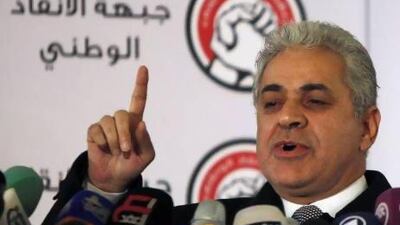CAIRO // Supporters of president Mohammed Morsi may have won the battle over the constitution, but the re-energised opposition movement made it clear yesterday that it would continue a campaign of protests and put its efforts into upcoming parliamentary elections.
Preliminary results from the referendum showed 64 per cent of the voters approving the controversial constitution. The final break-down is expected this week.
The Muslim Brotherhood's Freedom and Justice Party said the vote was proof the "Egyptian people continued the march towards completion of their modern democratic state, having irrevocably folded the dark pages of past injustice and oppression".
About 56.5 per cent voted yes in the first round on December 15, with 70 per cent approving it in the final day of voting on Saturday, it said. The National Salvation Front, an umbrella group opposing the constitution, confirmed the results by its own tallies but called on the Supreme Electoral Commission to investigate its claims of irregularities and breaches before announcing the final results this week.
The Front said yesterday it would carry on its fight to take down the constitution by "peaceful means". Officials also suggested that the approval of the constitution was not as widespread as Mr Morsi's supporters claimed because the turnout was lower than many of the elections since last year.
About a third of registered voters took part in the referendum, according to preliminary results.
The contrasting statements suggest a battle over the future of Egypt that is likely to define 2013.
The year will see court cases being filed by the opposition to annul the results of the referendum and supporters of Mr Morsi pushing for new parliamentary elections in March.
"I see more complications and more troubles in the coming weeks and months, unless the president takes on board what is going on and compromises with the opposition," said Hassan Nafaa, a professor of political science at Cairo University.
If parliamentary elections were held in two months, it would only increase the polarisation in the country, he said.
"It will look like a war between the Islamists and the non-Islamists," Mr Nafaa said. "The economy will continue to deteriorate if the impasse isn't resolved, and this is where we could see a big, big problem."
New conflicts between the judiciary and Mr Morsi are also possible, especially after Mr Morsi attempted in November to shield his decisions from oversight from the courts. He replaced that decree after huge demonstrations and a strike by judges, but the cold peace may only be temporary. The Supreme Constitutional Court has yet to issue its ruling on the legality of the 100-member committee that wrote the constitution.
In a sign of the deepening tensions between the courts and the executive branch, Mahmoud Mekki, Mr Morsi's vice president, resigned on Saturday. Mr Mekki is a former judge whose brother is Mr Morsi's minister of justice.
In a statement, he said that "politics does not suit my natural profession as a judge", adding that he had originally submitted his resignation on November 7 but stayed on to fulfil his duties.
Fresh parliamentary elections would show for the first time how far the opposition movement's message had spread in Egypt. Liberals and secularists performed poorly in last year's parliamentary elections, with nearly 70 per cent of the seats going to the Freedom and Justice Party and the more conservative Al Nour Party. But armed with new parties and a re-energised bloc of supporters, they are expected to put their full efforts into curtailing the influence of Islamists in the new People's Assembly.
If the constitution passes as expected, it would trigger the end of some of Mr Morsi's enlarged powers. The Shura Council, the upper house of parliament, would assume temporary legislative powers until the lower house elections that should take place two months after an approval of the constitution.
Mr Morsi appointed 90 people to the 270-member Shura Council on Saturday, a power granted to him under the old constitution. The new members came from 17 political parties and included eight women, 12 Coptic Christians and some Islamists, according to the state news agency MENA. But even with the additions, the body is still dominated by Islamists from the Freedom and Justice and Al Nour parties.
bhope@thenational.ae
Follow
The National
on
& Bradley Hope on

